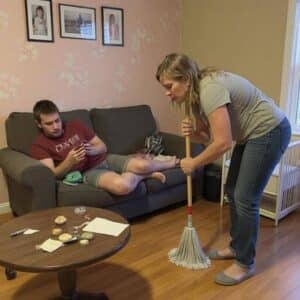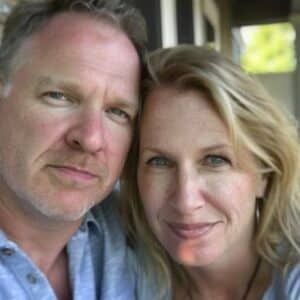A Cry in the Park: How a Routine Patrol Turned Me into a Father
It began like any other shift. I was patrolling a park in Modesto on a quiet morning when I spotted her—barefoot, wrapped in a thin hoodie, curled up on a bench. She couldn’t have been more than 19. When I gently asked if she was okay, she looked up with glassy eyes and whispered, “I’m just trying to keep her warm.”
That’s when I saw the tiny bundle on her chest—a newborn, barely a week old.
Meet Kiara and Nia
She told me her name was Kiara. She had aged out of foster care months earlier, gave birth in a motel, and ended up living on the streets. Her baby’s name was Nia. No birth certificate. No records. Just two souls trying to survive.
I called in for support, but something told me to stay. She wasn’t high, violent, or in denial—just exhausted and scared. We got them to a shelter, and I thought that was it.
But it wasn’t.
The First Connection
A week later, I visited the shelter, then again, and again. Kiara started trusting me—asking which diapers were best, how to tell if Nia had a fever. Then one day, she pulled me aside and said:
“I’m not ready to be a mom. But you… you care. She smiles when she sees you.”
I was floored. Who expects to be asked to adopt a child before dinner?
Reality Hits Hard
I didn’t say yes right away. I said I’d look into it. That night, I sat in my car outside the station and cried. I didn’t have a crib, much less parenting experience—but I knew I couldn’t walk away.
What I didn’t expect was how complicated adoption would be. CPS got involved. The shelter flagged my involvement as a potential conflict of interest. I was investigated, questioned, scrutinized. Background checks. Home visits. Psychological evaluations.
And worst of all, I wasn’t allowed to see Nia—for two months.
The Hardest Choice
During that time, Kiara worked hard. She joined a transitional program for young mothers, took parenting classes, got a part-time job. I began to wonder if she might keep Nia after all.
Then one morning, she called me in tears.
“I can’t be what she needs,” she said. “But you can. You already are.”
She wasn’t giving up. She was choosing the hardest form of love—letting go.
Becoming a Father
After she signed over her rights, things moved fast. I was cleared by the department. I learned to change diapers, soothe colic, and install a car seat—all while working full shifts.
My fellow officers stepped up. One donated a crib. Another dropped off formula and baby bottles. It was messy, overwhelming, and beautiful.
Then one day in court, the judge looked at me and said: “Congratulations, Mr. Duvall.” I broke down in tears.
I named her Nia Grace Duvall. I kept the name her mother gave her—to honor the woman who gave her life and gave her a future.
A New Chapter
Kiara visits on Nia’s birthday. She brings a small gift, hugs her tight, and tells her she’s loved. We don’t call her “mom”—Kiara asked us to wait until Nia is old enough to decide that for herself.
Nia is four now. She has the wildest laugh and the most joyful curls. She loves pancakes and dancing barefoot in the living room. Every time she wraps her arms around me and says, “I love you, Daddy,” I remember that park bench—and how close she came to slipping through the cracks.
When Love Isn’t in the Plan, But Finds You Anyway
I never planned to be a father. But it became the best thing that ever happened to me.
If you’re ever in a position to help someone—even when it’s inconvenient, scary, or complicated—lean in. The biggest blessings don’t always come wrapped in perfection. Sometimes they come wrapped in a hoodie, clinging to hope, waiting for someone to say, “I see you. I’ve got you.”





